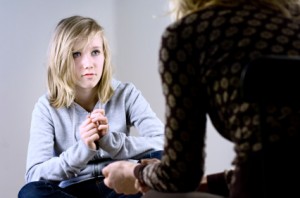Evidence-Based Psychotherapies for Young Children
 As many as 7–10% of children under the age of 5 have mood or behavioral problems, and this risk is even higher when a parent has a mood disorder. However, many families are not able to access treatment for these children due to their location, a lack of providers, or insurance problems.
As many as 7–10% of children under the age of 5 have mood or behavioral problems, and this risk is even higher when a parent has a mood disorder. However, many families are not able to access treatment for these children due to their location, a lack of providers, or insurance problems.
A 2016 article by Mary Margaret Gleason and colleagues in the journal Technical Report in Pediatrics summarizes psychotherapeutic treatments for children that are supported with rigorous evidence. Some of these include infant-parent psychotherapy, video feedback for positive parenting, attachment biobehavioral catch-up (or ABC, in which caregivers are taught to re-interpret the signals of children who previously experienced maltreatment, providing nurturing in response), parent-child interaction therapy, and programs that combine parenting support with illness prevention, such as the Incredible Years series (for behavioral difficulties), the New Forest Programme (for attention-deficit hyperactivity disorder or ADHD), and Helping the Noncompliant Child (for oppositional behavior).
Gleason and colleagues suggest that pediatricians should take the lead in assessing young children and recommending appropriate psychotherapeutic approaches.
One resource available to parents is our own Child Network. It consists of an online portal where parents can provide weekly ratings of their children’s symptoms. These can be provided to the child’s physician to facilitate diagnosis and to clinicians to more effectively evaluate the results of treatment. The data provided to the Child Network will in turn help us understand how children are being treated in the community. There a few initial forms to fill out, but the weekly rating process is quick and can provide a great picture of a child’s wellbeing over time, including evaluating the effectiveness of any treatments.
Therapy Reduces Relapses, Promotes Medication Adherence
A 2017 meta-analysis published in the British Journal of Psychiatry indicates that psychosocial interventions were linked to reduced relapse rates, better adherence to medication, and other benefits in people with bipolar disorder. The meta-analysis by researcher Mary Lou Chatterton and colleagues evaluated data from 41 studies with a total of 3,119 participants. The studies examined psychosocial interventions such as cognitive-behavioral therapy, psychoeducation, and family-focused therapy compared to treatment as usual.
Chatterton and colleagues found that interventions that targeted family members who act as caregivers reduced manic and depressive relapse rates. Combined psychoeducation and cognitive-behavioral therapy was more successful than any other intervention, and had a large effect in reducing symptoms of mania. This combination also improved general functioning. Psychoeducation alone and in combination with cognitive behavioral therapy reduced medication non-adherence. Unfortunately, no intervention reduced depressive symptoms.
Medical Device May Treat Alzheimer’s Disease
A recently completed clinical trial suggests that NeuroAD, a treatment system that combines transcranial magnetic stimulation and cognitive training targeted at brain regions affected by Alzheimer’s disease, may be effective at treating mild to moderate cases of the illness.
Neuronix Ltd, the company that produces the device used to deliver transcranial magnetic stimulation in the trial, plans to seek Food and Drug Administration approval for NeuroAD. It would be the first device approved for the treatment of Alzheimer’s in the US. The device is already in use in Europe and Asia.
In the clinical trial, 131 patients received six weeks of the NeuroAD treatment or a sham treatment used as a comparison. Those participants who received the real intervention performed better on an assessment of Alzheimer’s and experienced minimal side effects.
In transcranial magnetic stimulation, a non-invasive procedure, magnets placed near the skull stimulate electrical impulses in the brain. This activates neurons, releasing excitatory transmitters and brain-derived neurotrophic factor (BDNF), which is important for new synapse formation and long-term learning and memory.
Editor’s Note: This editor (Robert Post) has long advocated the use of repeated transcranial magnetic stimulation (rTMS) with simultaneous cognitive behavioral or other positive therapy to activate and enhance specific neural circuits and relieve depression. The trial of NeuroAD adds evidence of the positive effects of this approach in domains other than depression. Cognitive training enhanced by rTMS may be helpful with a variety of cognitive difficulties.
Mindfulness-Based Cognitive Therapy May Improve Depression More Than Fitness Intervention
In a study by researcher Stuart Eisendrath and colleagues, people with treatment-resistant unipolar depression responded better to an intervention that combined mindfulness training with cognitive therapy than to one that included exercise, nutrition counseling, and music therapy.
The 173 participants had failed to respond to at least two different antidepressant medications. During the study period, all participants were taking an antidepressant, but none were receiving other types of therapy.
After eight weeks, the mindfulness-based cognitive therapy (MBCT) group showed greater improvement in their depression symptoms than the exercise and nutrition group. Of the MBCT group, 29.58% had a large reduction in symptoms, while 17.19% of the comparison group showed a similarly large reduction in symptoms.
A subgroup of the participants also received functional magnetic resonance imaging (fMRI) as part of the study. While completing a task related to emotional working memory, the MBCT group showed enhanced activation of the dorsal lateral prefrontal cortex (to levels seen in non-depressed people). This area is related to executive control of depression and memory functions. The MBCT group also showed reduced activation of the ventral lateral prefrontal cortex compared to the comparison group. Members of the MBCT whose depression symptoms had improved also showed better regulation of the amygdala during the task compared to the exercise and nutrition group.
The research was presented at the 2016 meeting of the American Psychiatric Association.
Psychotherapy Improves Outcomes for People with Bipolar Disorder
Studies have shown that therapy can be helpful for people with bipolar disorder. In a 2016 article in the British Journal of Psychiatry, researchers led by M. Oud described the findings of their systematic review of studies evaluating different types of therapy for bipolar disorder. The research team reviewed the findings of 55 randomized controlled trials of psychotherapeutic interventions that included a total of 6,010 adult participants with bipolar disorder. The team found moderate-quality evidence that psychological interventions reduced relapses following treatment, and that collaborative care reduced hospital admissions for adults with bipolar disorder. Oud and colleagues found lower-quality evidence that group interventions reduced depression relapses following treatment, and that family psychoeducation reduced symptoms of depression and mania.
The reseachers concluded that there is evidence that therapy can be helpful for people with bipolar disorder. Since some of the evidence was of low quality, more research is needed to identify the most effective therapies for different phases of bipolar disorder.
Editor’s Note: The data are clear that therapy is helpful. In particular, one approach worth emulating is that described in an article by Lars V. Kessing and colleagues in the British Journal of Psychiatry in 2013. They found that comprehensive care in an outpatient mood disorder clinic, which included psychotherapy, psychoeducation, mood monitoring, and drug treatment, reduced relapses significantly compared to treatment as usual.
Traditional Antidepressants Are Not Effective in Bipolar Depression
 Bipolar illness affects 4.5% of the US population. According to researcher Kathleen Merikangas, 1.0% have bipolar I disorder, 1.1% have bipolar II disorder, and the remainder have subthreshold symptoms. Mark Frye, Chairman of the Department of Psychiatry at the Mayo Clinic, gave a lecture on antidepressants in bipolar illness at the 2014 meeting of the American Psychiatric Association.
Bipolar illness affects 4.5% of the US population. According to researcher Kathleen Merikangas, 1.0% have bipolar I disorder, 1.1% have bipolar II disorder, and the remainder have subthreshold symptoms. Mark Frye, Chairman of the Department of Psychiatry at the Mayo Clinic, gave a lecture on antidepressants in bipolar illness at the 2014 meeting of the American Psychiatric Association.
The newest data from meta-analyses indicate that traditional antidepressants that are effective in unipolar depression are not effective in bipolar depression. Some patient groups, especially those with very early onset depression and mixed depression, are at increased risk of switching into mania and making a suicide attempt while taking antidepressants.
Unipolar depressed patients with a genetic variation that produces a short form of the serotonin transporter (5HT-LPRs/s) are at increased risk for depression in adulthood following a history of childhood adversity, and tend to respond less well to antidepressants. Frye found that 5HT-LPRs/s is weakly associated with switching into mania when antidepressants are given to patients with bipolar depression.
At the same symposium, researcher Mike Gitlin reviewed data on combination therapy, which is rapidly becoming the norm, indicating that in most circumstances, it is superior to monotherapy.
Researcher David Miklowitz reviewed the impressive data on the superiority of most forms of targeted psychotherapy or psychoeducation compared to treatment as usual for bipolar depression. He noted his own finding that Family Focused Therapy (FFT) not only is effective in adolescents and adults with bipolar disorder, but also in reducing illness and dysfunction in those with prodromal disorders (such as depression, cyclothymia, and bipolar not otherwise specified) in situations where there is a family history of bipolar disorder.
Eight components of FFT are:
- Recognition of prodromal symptoms and development of treatment strategies for them.
- Recognition and management of stress and triggers using cognitive restructuring.
- Development of a relapse prevention plan and rehearsal of what to do.
- Regularization of sleep.
- Encouragement of treatment adherence with an eye to a good future.
- Enhancement of emotional self-regulation skills, including cognitive restructuring.
- Improvement of family relationships and communication.
- Education about substance abuse avoidance and treatment for that and other comorbidities.
Many of these are also key components of group psychoeducation, cognitive-behavioral therapy, and interpersonal and social rhythms therapy, and all of these are effective in treating and preventing bipolar depression compared to treatment as usual. It is noteworthy that in the research of Francesc Colom, 90% of patients randomized to treatment as usual relapsed within 24 months, while psychoeducation was highly effective in preventing relapses over the next five years.
This editor (Robert M. Post), the discussant for the symposium, emphasized that the main take-away messages of the speakers were: use more lithium, use more caution and fewer antidepressants in treating bipolar depression, use more combination therapy for acute illness and for maintenance, and definitely use more psychotherapy. Read more
Psychotherapy Prevents Recurrence of Depression
New research shows that psychotherapy lowers the risk of relapse in unipolar major depression more than “treatment as usual” does, and also heads off depression in children at high risk.
At the 2013 meeting of the American Psychiatric Association, researcher Pim Cuijpers reviewed 32 trials of cognitive behavior therapy, intensive behavioral therapy, and problem solving therapy used for the prevention of depression and found that these therapies were associated with a 21% lower risk of relapse compared to treatment as usual.
There were five critical elements that made these therapies useful: they supported coping with depression, and they included exercise, mindfulness, internet-based cognitive behavior therapy, and problem solving.
Among those who presented at the meeting, Greg Clarke of Kaiser Permanente, Oregon discussed an 8-week course on coping with stress given to a group of adolescents (aged 14 to 16) who had four times the normal risk of developing depression because each had a parent with depression. Clarke found a significant reduction in depression among the adolescents who received therapy compared to controls.
Insomnia can be a precursor to a first depression or to recurrent depression. Cognitive behavior therapy was more effective in improving sleep than a comparative sleep hygiene course.
Researcher Judy Garber presented data showing that cognitive behavior therapy was effective in 13- to 17-year-olds who had a parent with depression and had themselves had a prior depression or were currently sub-syndromal. The effect of the therapy was only significant if the parent was not depressed at intake.






